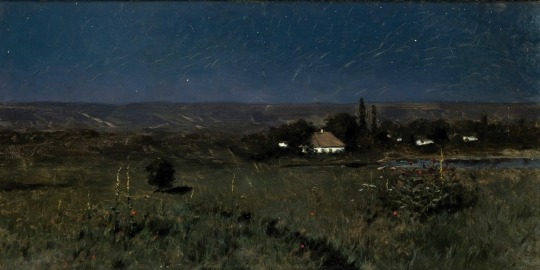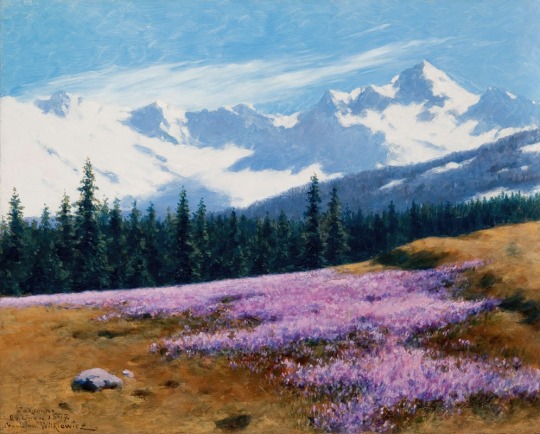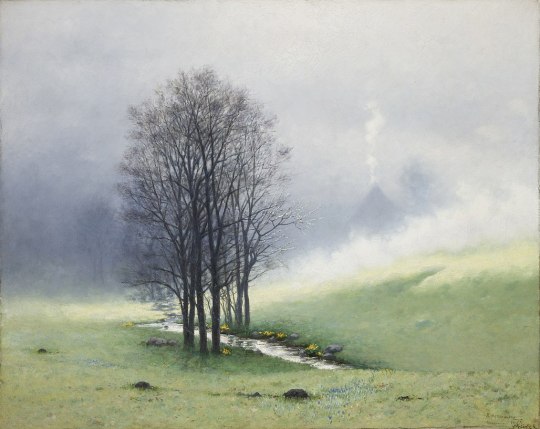#Witkiewicz
Explore tagged Tumblr posts
Text

Stanisław Witkiewicz, Noc ukraińska (Ukrainian Night)
1895, oil on canvas
#poland#polish culture#polish art#polish paintings#polish painters#european art#european paintings#european painters#european fine art#polska#stanisław witkiewicz#witkiewicz#landscape painting#Ukraine in Polish Art
341 notes
·
View notes
Text

witkiewicz-selfportrait
19 notes
·
View notes
Text

“Against the backdrop of these emotional transformations the pietistic drivel of Murti Bing slowly but surely began to infiltrate Genezip's stunted and metaphysics-hungry brain. The bulk of these potential and undeveloped feelings, states of mind, and thoughts—connected as they were with a sense of the world's infinite mystery and the personality that was as self-contained as a locked trunk—had failed to blossom into the structure, however rudimentary, of any genuinely religious feeling having God as its object; they had yet to crystallize or solidify into a system of primitive but nonetheless precise thoughts. Instead, they were gradually disintegrating into a sort of boneless, undifferentiated pulp. The vague and blurry outlines of a conceptual framework, composed as it was of unrelated parts (i.e., such banal notions as "maximal unity within duality"), could scarcely be expected to form an agent of mental crystallization and were tantamount to a superficial narcotic anesthetiving all intellectual endeavor in the embryonic stage. How nice it would have been to plug with any sort of cork that little hole leading to the bottomless abyss, as long as it enabled one to become reconciled with the monstrosity of existence, which was everywhere conspicuous. How nice it would have been to stretch out in some halfway perfect world as in some cozy easy chair—not forever, but only for a while, for just a moment of that sublime love which appeared so fragile in comparison to the ominous powers mounting on all sides. But the new faith could not bestow on Zipcio the strength to say, "No matter what happens, I'll weather the storm," nor the strength to stomach every conceivable sort of reality. Was it worthwhile trying to undertake something on a grand scale when it was impossible to decide the future in an unequivocal manner? What would life be like if the Chinese prevailed? And if, which was highly improbable and which no one seriously believed, Poland, that eternal bulwark, were to repel the Mongolian avalanche? In that case, the future would have looked even more uncertain. The ruins of an artificial fascism, Poland was being supported by a communist West and was inexorably threatened, if not by the Chinese then by its own communists. Genezip soon gave up trying to plumb the ultimate meaning of life's cruel harlequinade and contented himself with the fact that all the ultimate truths had already been conferred upon Murti Bing by the Maximal Unity—this much was apparent from his vision. Suffice it to say that anyone who has never had such a vision cannot possibly know how frightfully convincing they can be. It would be quite inappropriate to elucidate their entire system here; not even a dog would have had the patience to sit through an ordeal like that. It was something in between religion and philosophy which by itself was something utterly preposterous; everything was deliberately vague, improperly thought out; everything was wrapped in idea-masks whose sole purpose was to camouflage and eliminate problems of serious concern. The result? A simple-minded benevolence and stupefaction tolerating every conceivable act of violence. Or so thought all those who had contracted the disease of Murtibingitis acuta, as the quartermaster was fond of calling it (still?). The general tendency in this direction was greatly accelerated by the events of July; to unwind a little before the final catastrophe was the only thing approaching a common goal, as no one ventured to think in long-range terms anymore. Thus did those "yellow devils" pave the way for their ineluctable conquest; that is, by putting everyone to sleep and then strangling them. One of the few persons who did not submit to the New Faith was Hardonne. He felt not the slightest compulsion to, as he put it, decipher the "signs of the end in the sky of reason," and so he went on composing even wilder things, drank, indulged in the most depraved activities, and had his fill of girls—what more could he have wanted?
(tumblr required a text break here that doesn’t exist in the original text)
The artist—ugh—the most revolting concept of that day and age: a worm in a carcass. Alas, such were the narcotic thoughts (on the eve of universal stupefaction) (science, in the popular sense, was defunct, while philosophy had reached an impasse) toward which mankind was heading, and they were being hatched right before our very eyes. But how many "simplifiers," noble-minded (really?) optimists, and clever businessmen of the psyche were able to perceive this or even wanted to perceive it?” [p. 363, 364]
2 notes
·
View notes
Text

#nie wierzę że reluję z wypowiedzią postaci która wyszła z zapijaczonego umysłu witkiewicza#polblr#szewcy#witkiewicz
2 notes
·
View notes
Text

Walka (1921 - 1922)
Stanisław Ignacy Witkiewicz (Polish, 1885-1939)
Witkiewicz was reared at the family home in Zakopane. In accordance with his father's antipathy to the "servitude of the school," he was home-schooled and encouraged to develop his talents across a range of creative fields. Against his fathers wishes he studied at the Kraków Academy of Fine Arts with Józef Mehoffer and Jan Stanisławski.
Witkiewicz was close friends with composer Karol Szymanowski and, from childhood, with Bronisław Malinowski and Zofia Romer. Romer was romantically linked to both Bronisław Malinowski and Witkiewicz. He had a tumultuous affair with prominent actress Irena Solska who according to Anna Micińska is represented as the heroine Akne Montecalfi in his first novel, The 622 Downfalls of Bungo or The Demonic Woman, 1911. According to Micińska he also represented himself as the character Bungo and Malinowski as the Duke of Nevermore. The unfinished novel, which was not published until 1972, also describes erotic encounters between Bungo and the Duke of Nevermore. Taught wet plate photography by his father, it was during this period that he also began producing the intimate portrait photography for which he is known; producing striking portraits of his circle in Zakopane and many self-portraits.
In 1914 following a crisis in Witkiewicz's personal life due to the suicide of his fiancée Jadwiga Janczewska, for which he blamed himself, he was invited by Malinowski to act as draftsman and photographer on his anthropological expedition to the then Territory of Papua, by way of Ceylon and Australia. The venture was interrupted by the onset of World War I. After quarrelling with Malinowski in Australia, Witkiewicz who was by birth a subject of the Russian Empire, travelled to St Petersburg (then Petrograd) from Sydney and was commissioned as an officer in the Pavlovsky Regiment of the Imperial Russian Army. His ailing father, a Polish patriot, was deeply grieved by his son's decision and died in 1915 without seeing him again.
In July 1916 he was seriously wounded in the battle on Stokhid River in what is now Ukraine and was evacuated to St Petersburg where he witnessed the Russian Revolution. He claimed that he worked out his philosophical principles during an artillery barrage, and that when the Revolution broke out he was elected political commissar of his regiment. His later works would show his fear of social revolution and foreign invasion, often couched in absurdist language.
0 notes
Photo

Stanisław Witkiewicz (Polish,1851-1915)
Wiatr halny (Foehn wind), 1895
oil on canvas
679 notes
·
View notes
Text
paintings round 5 poll 8


Halny by Stanisław Witkiewicz, 1895
propaganda: skłębione chmury, gwiaździste niebo i ty twarzą w twarz z wiatrem, który kładzie drzewa [billowing clouds, starry sky, and you - face to face with the wind that can fell a tree]
Flight of the cranes by Józef Chełmoński, 1871:
propaganda: I have no big words, I just love the colors here. Also remainds me of standing at the kitchen window and watch the cranes on the fields.
104 notes
·
View notes
Text

Foehn wind, 1895 - oil on canvas — Stanisław Witkiewicz (Polish, 1851-1915)
#Stanisław Witkiewicz#art#paintings#oil on canvas#oil painting#atmospheric#nature#gloomy#landscape#night#mountains
764 notes
·
View notes
Text

Crocuses with Snowy Mountains Behind, 1897 by Stanisław Witkiewicz (1851-1915)
#stanisław witkiewicz#art#painting#oil painting#oil on canvas#19th century art#19th century#polish art#polish painters#realism#landscape
550 notes
·
View notes
Text

Stanisław Ignacy Witkiewicz - Portrait of Maria Nawrocka (1929)
91 notes
·
View notes
Text

Crocuses with Snowy Mountains Behind
1897
Stanisław Witkiewicz (Polish, 1851-1915),
#dark academia#light academia#classical#academia aesthetic#escapism#academia#books and libraries#classic literature#books#architecture#art#artist#painting#painter#Stanisław Witkiewicz#polish#Crocuses#snowy#mountains#1800s#19th century#royal core#cottage core#academic#artistic#aesthetic#academics#aesthetics#vibe#tumblr
94 notes
·
View notes
Text

Stanisław Witkiewicz, Mgła wiosenna (Spring Mist)
1893, oil on canvas
#poland#polish culture#polish art#polish paintings#polish painters#european art#european paintings#european fine art#polska#stanisław witkiewicz#witkiewicz#landscape paintings#spring landscape
145 notes
·
View notes
Text

Self-Portrait, Stanisław Ignacy Witkiewicz, 1910
163 notes
·
View notes
Text
date idea there's a corpse in my room and it looks just like you . and we're in zakopane in 1914
#niebezpieczni dżentelmeni#polishposting#polblr#witkaboy#tadeusz boy żeleński#witkacy#stanisław ignacy witkiewicz
154 notes
·
View notes
Text

Chamois in the mountains by Stanisław Witkiewicz (between 1890 and 1900)
#Chamois in the mountains#Stanisław Witkiewicz#polish#painter#animal#landscape#art#painting#mountain#snowy#winter#season
41 notes
·
View notes
Text
Stanisław Ignacy Witkiewicz – Szewcy
Stefan Żeromski – Przedwiośnie


#bitwa lektur szkolnych#runda 3#szewcy#stanisław ignacy witkiewicz#witkacy#przedwiośnie#stefan żeromski
107 notes
·
View notes